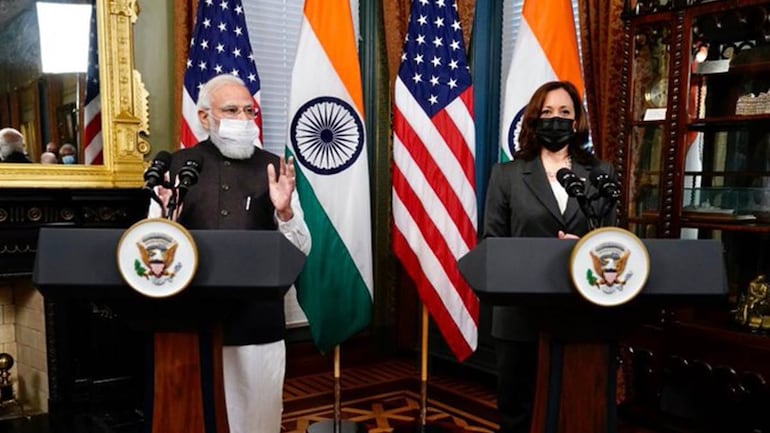US President Joe Biden and Vice President Kamala Harris performed a subtle and clever balancing act when they reminded visiting Prime Minister Narendra Modi during their separate meetings in Washington September 23-24 of the need for upholding the values of democracy and the ‘common bond’ between the ‘natural partners’ – the oldest democracy (USA from 1728) and the largest democracy (India with a population nearing 1.5 billion). The meetings took place when the top leaders of the Quad group of the USA, Australia, Japan and India had their first in-person summit. The importance of the main event was further accentuated by the formation of the tri-nation grouping of Australia-UK-US (AUKUS) a few days back with the objective of containing China and frustrating the latter’s unilateral expansionist designs in the South China Sea.
It was only natural that the US administration would send out a loud and clear message that the importance of Quad is not undermined by the new alliance of the AUKUS, even though the latter makes a qualitative difference in the strategy of the leading ‘democracies’ to unitedly take on China. In the first place, Quad is not a military alliance while at the core of the AUKUS grouping is the Australia-US nuclear-powered submarine deal. Though it will take several years before Australia gets the US submarines, the deal has unnerved China. It has fulminated against the alliance and has termed it an attempt to revive the Cold War years and trigger an arms race in the Indo-Pacific region. Predictably, India would be only too happy to see much of its burden of fighting an aggressive and hostile China, constantly nibbling its territories and encircling it, shifted to the American, Australian and British shoulders. But India along with Japan appears nonetheless concerned about the possible reduction of the importance of the Quad following the mightier tri-nation alliance.
Significantly, the question of India and Japan being subsequently included in the AUKUS in some form or the other was raised before the US administration as the Quad leaders met. The White House Press Secretary Jen Psaki not only dismissed the possibility outright, but even joked before the media about the suggestion. She said the formation of the AUKUS was not meant to be an indication, but the US President clearly sent out the message to the world through the French President Emmanuel Macron that there is no one else who will be involved in the security of the Indo-Pacific region. Psaki seemed to have been so much regaled by the suggestion that she retorted with the rhetorical question what AUKUS would then become? JAUKUS (J for Japan)? Or, JAIAUKUS (JAI for Japan and India). The fact that the US Press Secretary could be joking on the inclusion of India and Japan into the alliance in such a manner shows the intentions of the three countries to jealously guard the secrecy of not only the military cooperation but more so the nuclear powered attack submarines that are to be given to Australia.
That is understandable. But, what apparently strikes as a jarring note is the insistence of Biden and Harris on raking up the issue of India’s track record of respecting democratic values under the Modi dispensation. Seemingly, it was needless since the agenda included the multinational groupings in the Indo-Pacific, COVID and concerns of climate change. The question is whether the US President and Vice President strayed from the agenda during their interactions with Prime Minister Modi to keep him under pressure so that he doesn’t sing a different tune when the USA needs India both as an ally for tackling Taliban-led Afghanistan after the US pullout and also cornering China in the Indo-Pacific. The answer is probably that they need to keep their own domestic constituencies in good humour by showing them that Modi was definitely not a favourite of the present US administration.
Obviously, the USA would like to see India as an ideological and strategic partner to thwart China’s rise, but it is probably becoming increasingly difficult to overlook or explain the assaults on civil liberties and the threats to India’s minorities under the BJP-led government. The record of the BJP rule has sent disturbing signals to the international community, including the USA. But, if America’s new alliance of democracies against China is to become meaningful, the constituents of the coalition need to be democratic as well. Clamouring for safeguarding human rights in China would lose its meaning if the USA ignores gross violations by any of its allies. This could be why Biden and Harris deliberately raised the issue of protecting democratic principles before Modi. Biden was rather indirect when he spoke about the coming birth anniversary of Mahatma Gandhi, who had given his life for the democratic principles of tolerance and equal opportunities. But Harris was more straightforward when she told Modi democracies around the world are under threat and it is imperative that “we defend democratic principles and institutions within our respective countries and around the world.” To din the message into Modi’s ears without sounding too offensive she even said she knew from her personal experience and family of the “commitment of the Indian people to democracy.” Noteworthy is that one of her nieces had raised her voice against the Modi government’s repression of farmers protesting against three farm laws.
This may not sound music to the BJP’s ears as the party’s propaganda machinery would heap praise on Modi’s ‘successful’ US trip. But, that’s the reality that can’t be wished away or glossed over. International politics does not depend on any individual anymore. Eventually, it will be India which will be the gainer or loser in this game of checkmating China.
